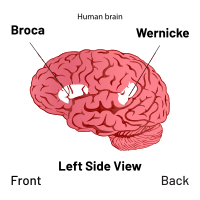
Back بوابة:لسانيات Arabic Портал:Езикознание Bulgarian Portal:Lingüística Catalan Portal:Linguistik German Portal:Lingüística Spanish Portail:Linguistique French Portál:Nyelvészet Hungarian Portale:Linguistica Italian Portal:言語学 Japanese Портал:Лингвистика Macedonian
- For a topical guide of this subject, see Outline of linguistics
Welcome to the Linguistics Portal!Linguistics is the scientific study of language. The areas of linguistic analysis are syntax (rules governing the structure of sentences), semantics (meaning), morphology (structure of words), phonetics (speech sounds and equivalent gestures in sign languages), phonology (the abstract sound system of a particular language), and pragmatics (how the context of use contributes to meaning). Subdisciplines such as biolinguistics (the study of the biological variables and evolution of language) and psycholinguistics (the study of psychological factors in human language) bridge many of these divisions. Linguistics encompasses many branches and subfields that span both theoretical and practical applications. Theoretical linguistics (including traditional descriptive linguistics) is concerned with understanding the universal and fundamental nature of language and developing a general theoretical framework for describing it. Applied linguistics seeks to utilize the scientific findings of the study of language for practical purposes, such as developing methods of improving language education and literacy. Linguistic features may be studied through a variety of perspectives: synchronically (by describing the structure of a language at a specific point in time) or diachronically (through the historical development of a language over a period of time), in monolinguals or in multilinguals, among children or among adults, in terms of how it is being learnt or how it was acquired, as abstract objects or as cognitive structures, through written texts or through oral elicitation, and finally through mechanical data collection or through practical fieldwork. Linguistics emerged from the field of philology, of which some branches are more qualitative and holistic in approach. Today, philology and linguistics are variably described as related fields, subdisciplines, or separate fields of language study but, by and large, linguistics can be seen as an umbrella term. Linguistics is also related to the philosophy of language, stylistics, rhetoric, semiotics, lexicography, and translation. (Full article...) Selected article - The Linguistic Society of America (LSA) is a learned society for the field of linguistics. Founded at the end of 1924 in New York City, the LSA works to promote the scientific study of language. The Society publishes two scholarly journals, Language and the open access journal Semantics and Pragmatics. Its annual meetings, held every winter, foster discussion amongst its members through the presentation of peer-reviewed research, as well as conducting official business of the Society. Since 1928, the LSA has offered training to linguists through courses held at its biennial Linguistic Institutes held in the summer. The LSA and its 3,500 members work to raise awareness of linguistic issues with the public and contributes to policy debates on issues including bilingual education and the preservation of endangered languages. Did you know...From Wikipedia's "Did You Know" archives: 
Related PortalsThings you can do
WikiProjectsThe following WikiProjects work to improve topics concerned with linguistics:
Associated WikimediaThe following Wikimedia Foundation sister projects provide more on this subject:
Discover Wikipedia using portals |


























